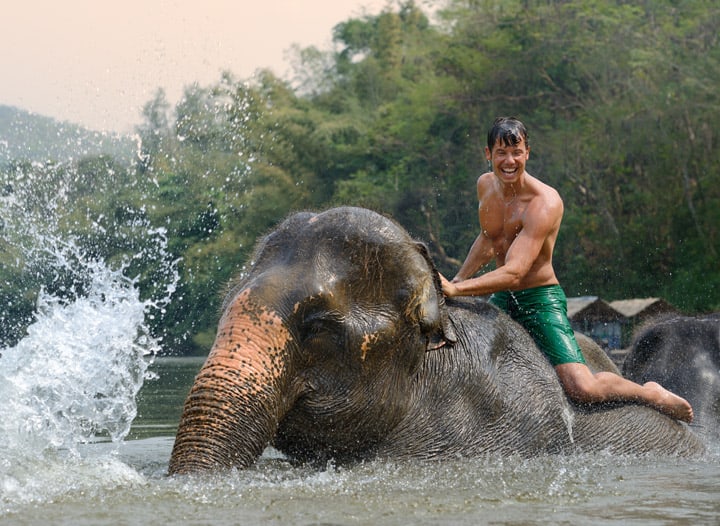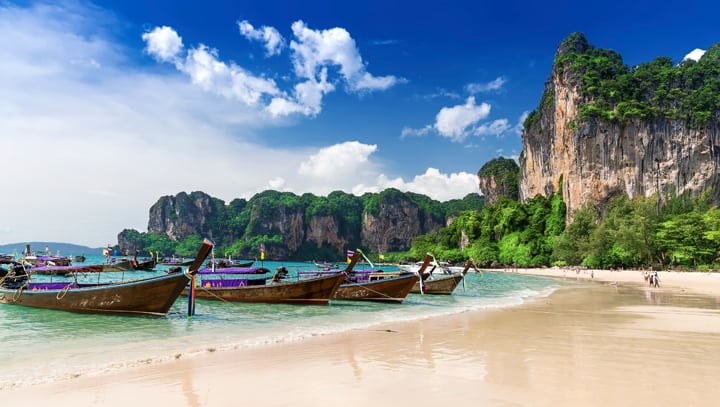
Gay Thailand · Country Guide
Planning a trip to Thailand? Our gay Thailand country guide page will help you get the most out of your visit.

We have detailed travel advice for destinations within Thailand, including Bangkok, Chiang Mai, Koh Samui, Pattaya and Phuket.
Gay Rights in Thailand
Thailand is one of the most tolerant and LGBT-welcoming countries in Asia.
Thailand's official Tourist Authority has run marketing campaigns to promote Thailand as a destination for LGBT travelers.
The recently enacted Gender Equality Act (2015) criminalises most forms of discrimination on the basis of sexual orientation.
The age of consent is 16 for everyone. Same-sex sexual activity is legal. Same-sex marriages, civil union or domestic partnerships are not recognised by law. Adoption by gay couples is not permitted.
Thai gay couples are widely accepted in society, especially in urban areas like Bangkok Pattaya or Phuket.
Thailand Regions
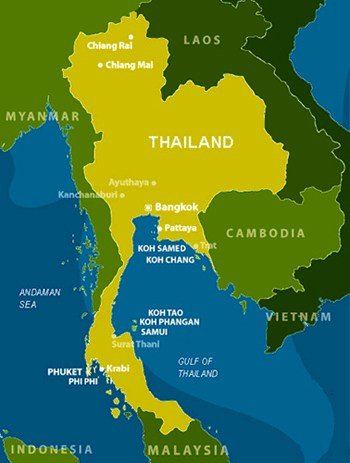 Thailand is divided into four main regions: North, Northeastern (also known as "Isaan"), Central and the South.
Thailand is divided into four main regions: North, Northeastern (also known as "Isaan"), Central and the South.
Bangkok is in central Thailand.
Popular tourist destinations in the North include Chiang Mai and Chiang Rai.
Southern Thailand boasts famous beach destinations such as Phuket, Krabi and Phi Phi in the Andaman Sea and Koh Samui.
Other islands worth visiting are Koh Samet and Koh Chang in the East and Koh Tao and Koh Pha-Ngan.
Gay Scene in Thailand
Bangkok is Thailand's only really big city, with a population of about 8 million. Bangkok has the biggest gay scene in the country with a good choice of gay bars, a couple of gay dance clubs, a large number of gay saunas and massage spas.
Large-scale gay dance parties are held around New Year and SongKran, attracting thousands from around Asia and beyond. Away from the main gay scene is a relatively small "commercial" red light district.
 White Party, Bangkok
White Party, Bangkok
Outside Bangkok, there are established gay scenes in Chiang Mai, Phuket and Pattaya, Koh Samui and Hua Hin.
Weather
November to February is regarded locally as the "cool season". Very comfortable temperatures vary from 25°C to 32°C in Bangkok and Southern Thailand. Temperatures can be lower in Northern Thailand (Chiang Mai, etc.), particularly at night.
February to April is very hot and dry with temperatures around 30°C to 34°C but often higher, peaking in April.
May to October is hot, humid and wet, particularly during July and August. However, tropical storms tends to dump their load and move on quickly, so many days will see plenty of sunshine.
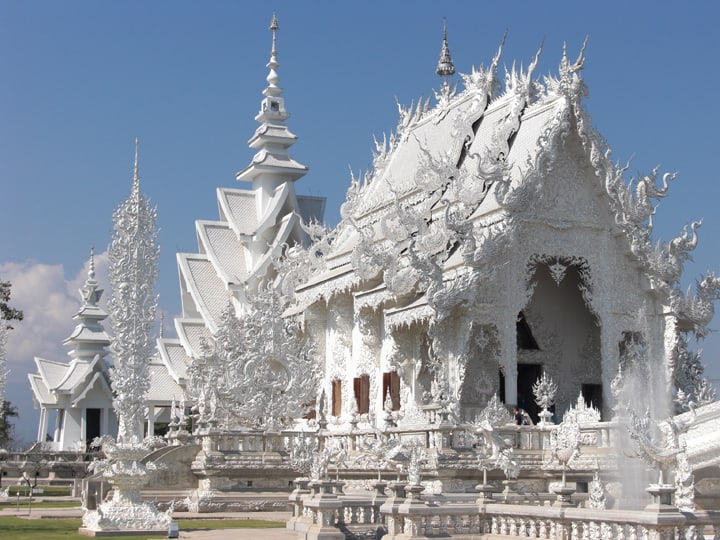 Wat Rong Khun (White Temple), Chiang Rai
Wat Rong Khun (White Temple), Chiang Rai
When to Visit
The tourist season runs from November until after SongKran (Thai New Year - mid April). Peak season is from December to February.
For gay travelers, New Year's Eve and SongKran are excellent times to visit Thailand, particularly Bangkok. Expect wild celebrations, plenty of parties and the gay scene to be at its best.
Thailand's beaches and islands are best visited slightly off-peak season, outside of school holidays. The gay scene in Bangkok (and the city) is busy and popular all year.
Passports & Visas
Most tourists can enter the Kingdom for up to 30 days without a visa (click here for a list of countries).
Your passport must be valid for at least 6 months after the date of your arrival in Thailand and you need proof of onward travel (e.g. a confirmed air ticket).
Consult your local Thai embassy before travelling if you plan to stay longer, work or visit more than three times in any six-month period.
If you exceed your permitted stay, you will be fined 10,000 baht per day on departure and may banned from returning.
By law, you should keep your passport with you at all times. Very few tourists do this, preferring to keep their passport locked in their hotel safe. However, it is a good idea to keep a photocopy in your wallet (particularly if you are shopping as you will need the details to reclaim VAT).
 Grand Palace, Bangkok
Grand Palace, Bangkok
What to Wear
Day wear - shorts, jeans, T-shirts, polo shirts combined with trainers, comfortable shoes or sandals. A cap or hat to cover your head is essential, as are sunglasses.
Business wear - smart trousers, formal shirt. Tie and jacket are required only for a very formal environment.
Temple wear - you must wear clothes that cover your legs down past your knees, your shoulders, upper arms, and everything in between!
Club wear - shorts or jeans, T-shirts or tank tops, trainers or similar. Many nightclubs (including DJ Station and G.O.D) and some upscale venues will refuse entry if you are wearing sandals or flip-flops.
Sauna wear - saunas provide towels, but taking your own rubber flip-flops is a good idea.
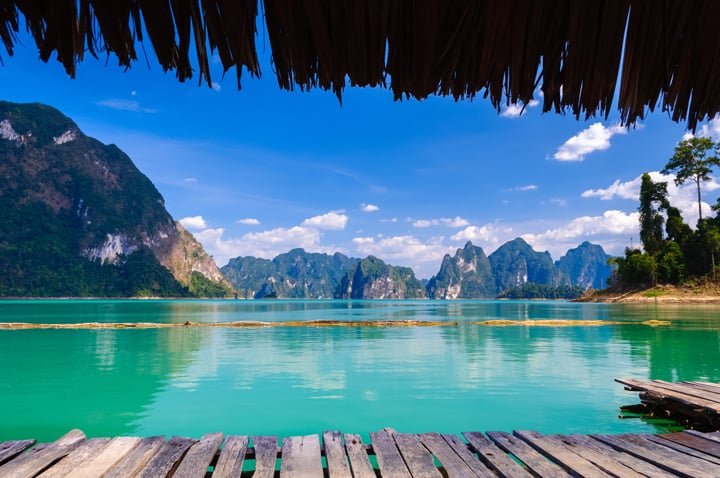 Khao Sok National Park, Surat Thani
Khao Sok National Park, Surat Thani
Culture & Customs
It is a criminal offense to make defamatory comments about the King or other members of the Thai Royal family. Thais have a huge amount of respect for their King. Criticism, even in private, is likely to cause offense.
Most Thais place a great deal of emphasis on avoiding confrontation or embarrassment. Raising your voice or acting in an aggressive manner (for example, towards a waiter in a restaurant) will be viewed by your companion as rude and embarrassing. In any case, such an approach is unlikely to resolve any difficulties you might have.
Public displays of affection, gay or straight, are generally frowned upon. Trying to stick your tongue down your new Thai friend’s throat in a public place (including a gay bar or club) is likely to cause him to choke with embarrassment.
Language
The national language is Thai. Most gay Thais you meet on the scene will be well-educated and speak very good English. English is widely spoken in tourist destinations, all hotels, restaurants and large stores.
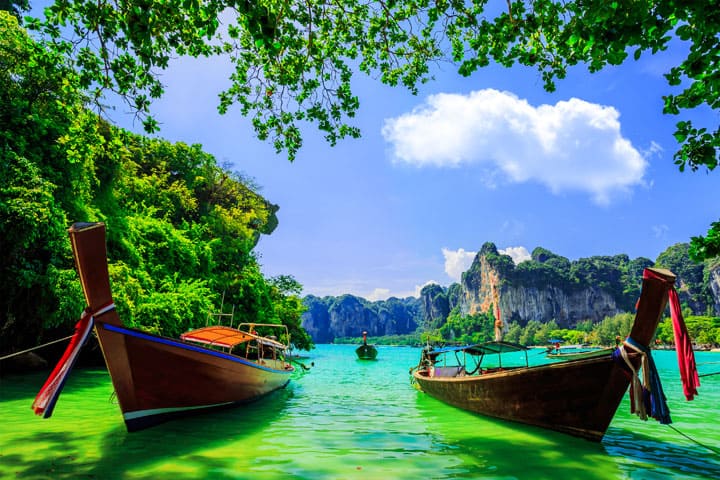 Longtail boat near Railay Beach, Krabi
Longtail boat near Railay Beach, Krabi
Money
Thailand's currency is the Thai baht (THB). Cash dispensers are widely available and accept foreign VISA and MasterCard cards. Credit, debit and AmericanExpress cards are widely accepted in shops, restaurants and hotels. You may be asked for photo ID.
Exchange rates in Thailand are very competitive, particularly for the US Dollar, Euro, British Pound, Singapore Dollar, Australian Dollar, etc. Bring as much cash as you feel comfortable carrying and exchange into Thai baht in Thailand. Larger denomination bank notes will get slightly better rates.
There are foreign exchange booths at all of Thailand's international airports where you can exchange some cash to pay for a taxi, etc., but rates will be more competitive in town.
There are foreign exchange booths and banks everywhere in Bangkok and other tourist destinations. Don't exchange money at your hotel as the rates offered will be poor.
Try to keep a reasonable quantity of 20 or 50 baht notes in your wallet for tipping.
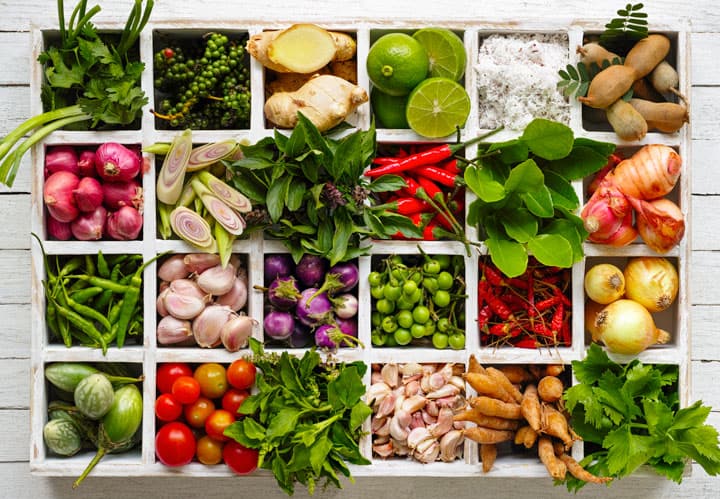 Eating fresh, authentic Thai food will is a highlight of any holiday
Eating fresh, authentic Thai food will is a highlight of any holiday
Tipping
Restaurants - Many restaurants add a 10% service charge to the bill, in which case no further tip will be expected. Otherwise tip up to 10%.
Bars & Clubs - Leaving a small tip, perhaps 20 baht per drink ordered, is a good idea.
Hotel Luggage boy - tip 50 or 100 baht.
Taxi - Rounding up the fare to the nearest 20 baht is a good idea (20 baht being the smallest note - about 50 US cents)
Massage - Tips make up most of your masseur's income. A generous tip is expected and usually deserved. Expect to give at least 200 baht for a one-hour foot massage. Many spas will display a sign showing the minimum tip. If in doubt, ask the receptionist.
Tax Refunds
Foreigners can reclaim 7% sales tax on larger purchases from shops and department stores that operate the Tax Refund Service. You will need your passport details at the time of purchase.
At the airport, before checking in you luggage, go to the Tax Refund counter to have your purchases checked. After immigration, go to the Tax Refund office to get a cash refund.
Try Elephant riding in Northern Thailand
Travel Insurance
Essential for all travelers. You will be expected to pay for all medical treatment you receive.
Drinking Water
Tap water is not drinkable, even in luxury hotels. Most shops provide hygienically wrapped straws when buying a bottle of water or canned drink. Don't drink directly from a bottle or can.
Electricity
220 volts throughout the country. Two-prong (flat and round) plugs are used.
Condoms / Lube / Poppers
Condoms and lube are widely available, although the best advice is to bring your own.
Poppers are illegal in Thailand.
HIV
Be aware that Thailand, like many other countries in Southeast Asia, has an incredibly high rate of HIV infections within the gay community.
Be careful of...
Renting a motor cycle
Avoid. A staggering 12,000 people are killed on Thailand's roads every year. The vast majority are motorcyclists. Hundreds of thousands are injured. As well as the physical risks, you are more likely to be pulled over by police than a local. Third party insurance is very rarely included in hire fees.
Jumping on a taxi bike for a short journey is reasonably safe, so long as you wear a helmet.
Jet skis, paragliding & banana boat rides
Operators are unregulated and are unlikely to be insured. The slightest bump or scratch to a jet ski may result in hefty additional fees.
Drugs
Thailand has harsh punishments for those found with or using drugs. There are many foreigners in Thai jails who thought they would not get caught. You have been warned!
Emergency Contacts
Most visits to Thailand are completely trouble-free. If you do run into problems, contact:
Tourist Police 1133
Police 191
Fire 199
Medical Emergency 1555
Join the Travel Gay Newsletter
Have we got something wrong?
Are we missing a new venue or has a business closed? Or has something changed and we have not yet updated our pages? Please use this form to let us know. We really appreciate your feedback.
